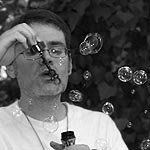Being disowned by your family is often an integral part of the queer experience. It’s a common story that I find is meticulously avoided in popular, escapist/pulp media—an effect of heterosexism that erases and denies the reality of gay lives: “No kween, make us laugh!” Sometimes I wonder how different my life would be if my father and mother had disowned me. It would be revealing to watch a movie of my life without my father’s influence—a twisted version of It’s a Wonderful Life.
My family didn’t disown me.
However, they also have never been 100% embracing. I’ve never heard them espouse a sincere message like: we love and celebrate all of you—exactly the way you are. Instead, they’ve let their bias and disgust of gays slip out in small and subtle ways over the decades, and I learned early on not to push the issue. To complicate the matter, I have a dysfunctional relationship with my brother and my parents, and I’m denied an opportunity to talk about the ways they hurt me or fail to support me. When it comes to shutting out conflict, my father has mastered the technique I call “family filibuster.”
Through the years, I’ve listened to my family say over and over that they love me, and I’ve wondered how different their notion of love is from mine. The affection they offer me (mom, dad, and brother) is not what I consider love because it tacitly demands a connection with me where I never complain or create conflict. Moreover, since they cannot accurately reflect my values, experiences, and my identity, I see myself as a placeholder son. I exist in my family as a space for their projections.
In spite of that, I still acknowledge the support I’ve received from my family over the years. My family helps me with shelter and housing from time to time, and everybody else I know helps me with my finances (speaking of, I’ve got an auto inspection due next month if you feel like helping out). I realize that their money and support is a resource other people may not have — queer or not. But often, when my parents help me and I accept money from them—like when my car breaks down or I am short on money and risk losing my home or livelihood—I tell myself, “You are a sell-out, and this is hush-money you are accepting to maintain a lie.” That’s my own projection haunting me from my past.
I don’t want my family’s money. I want their unconditional love.
I accept and am grateful for the support I am offered because I foresee the alternative is to transition to Social Security disability income, become homeless, or live in prison. I once had a doctor advocate for disability payments when I was in my twenties, and that was probably my best chance. As an independent adult, I have struggled with depression, suicide attempts and living outside lawful conduct to support myself. And though I am unhappy about the current situation with my family, I dislike the idea of incarceration even more; I would choose homelessness over incarceration.
I spent one summer living out of my car and driving around a daily circuit of flea markets to support myself. I spent another summer living in a tent without running water or electricity, so I grew accustomed to a life of privation. Presently, I attend weekly meetings for support. The men in my support circle help me through all of this and bear witness to my emotions and struggle; they listen without judgment to my choices and my fury. They are a surrogate family that fills in the shortcomings of my biological one.
“The death of your father, the death of your mother, is something you prepare for all your life.”
Coil, from the song Broccoli.
I’m not sure what I will experience when my father and mother die. My ex lost his parents a while back, and I watched him closely through his mourning process. Like him, I’m sure I will grieve my family’s passing, and I will feel unendurable sadness. I will grieve that my relationship with them ended without ever becoming the relationship I wanted (actually, not waiting for that one). I will cling to regret long afterwards, but I suspect I will feel a measure of relief, too, and I’m okay with that.
I sometimes daydream about a quiet, sere land of hollow bones and empty sky; it’s a place I could reach if only I journeyed to forgive my parents for being flawed, imperfect humans and acknowledged how they suffered wounds of their own as children. It’s my concept of Original Sin—if I may reclaim that term from the Catholic faith.
Original Sin is a desolate site where Titans once fought and wounded each other and then passed those wounds on to the First Children. Thunder carries the memory of that place and sometimes causes me to cower.

Share this post with your friends.

